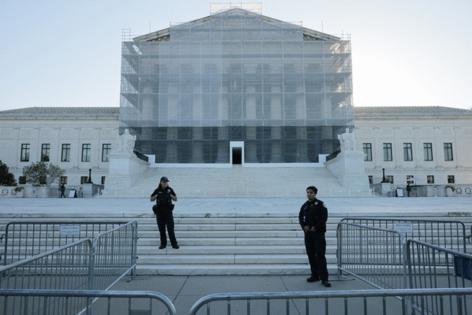Supreme Court to hear challenge to federal gun ban for drug users
Published in Political News
WASHINGTON — The Supreme Court announced Monday that it will decide the constitutionality of a federal law banning gun possession for anyone who is an “unlawful user” or addicted to any controlled substance.
Ali Danial Hemani was charged with violating the law when federal agents found cocaine, marijuana and a pistol during a search of his home. In a court filing, the government said Hemani told the FBI that he used marijuana about every other day, and that the cocaine belonged to him.
The U.S. Court of Appeals for the 5th Circuit held that the law violated the Second Amendment and only could be applied if Hemani or other defendants were under the influence at the time of their arrest with a firearm.
The Trump administration then appealed the ruling, arguing that while unjustified restrictions on gun rights “present a grave threat to Americans’ most cherished freedoms,” banning drug users from having guns was needed for public safety.
“Courts should exercise the utmost vigilance in guarding that right from legislative or regulatory infringement. There are, however, narrow circumstances in which the government may justifiably burden that right,” the administration said.
The federal ban addresses the dangerous combination of drugs and guns in a measured way, the government wrote, “prohibiting the possession of firearms only by habitual users of illegal drugs and allowing a person to regain the ability to possess firearms simply by ceasing his habitual illegal drug use.”
At least 32 states and territories have enacted similar laws, the government said.
The justices will likely hear oral arguments in the case and issue a decision by the end of the court’s term next June.
Earlier this month, the justices agreed to hear a dispute over the constitutionality of a Hawaii law restricting the concealed carrying of firearms at certain locations.
The case is the latest in a series of firearms law cases taken by the Supreme Court since the conservative majority expanded gun rights in the 2022 case of New York State Rifle & Pistol Association Inc. v. Bruen, which held that gun restrictions had to have historical examples to pass muster under the Second Amendment to the Constitution.
Last year, the justices upheld a federal gun possession ban for defendants subject to some kinds of domestic violence restraining orders in United States v. Rahimi, and the majority said that courts can use analogues, rather than exact historical examples, when examining gun restrictions.
In trying to justify the law in the Hemani case, the DOJ compared it to historical restrictions on gun possession for “habitual drunkards.”
“This restriction provides a modest, modern analogue of much harsher founding-era restrictions on habitual drunkards, and so it stands solidly within our Nation’s history and tradition of regulation,” the Trump administration wrote. “And habitual illegal drug users with firearms present unique dangers to society — especially because they pose a grave risk of armed, hostile encounters with police officers while impaired.”
The case is United States v. Ali Danial Hemani.
©2025 CQ-Roll Call, Inc., All Rights Reserved. Visit cqrollcall.com. Distributed by Tribune Content Agency, LLC.
























































Comments